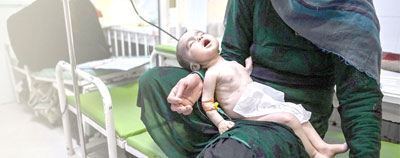In a little over three months, the situation appears to have come to a head for Afghanistan. A hasty pull-out by foreign forces may have handed the Taliban the reins to the country on a platter, but everything else since has been a tumultuous ride.
The Taliban’s efforts to establish their rule has been rocked by a series of bloody attacks by ‘Khorasan’ offshoot of the Islamic State.
But a far greater chal-lenge has been shaped by the global community’s reluctance to engage with the new regime in Kabul.
With the West in particular freezing all funds the Afghan government could once have laid claim too, an edifice built and sustained purely on foreign aid is collapsing.
After braving and surviving two decades of bloody conflict, the people of Afghanistan now face a new phase of crippling poverty and acute food shortage.
With their nation suspended between larger global forces again, there seems to be no end in sight once more.
Thirty-year-old Omid Hiran of Nangarhar province of Afghanistan is the sole breadwinner of his six-member family.
Hiran has a master’s degree in Pashto literature and before the takeover of the Af-ghan Taliban, he worked as a communications ex-pert at the presidential palace of Afghanistan and earned AFN 62,000 per month however, even be-fore the Taliban takeover, his two months salaries was not given to him by the government.
Since the fall of Kabul, Hairan has lost his job and is now facing severe financial issues. He spent all of his savings during the last five months and has now resorted to borrowing from others in order to pay rent and bills.
Another 35-year-old resident of Jalalabad city of Nangarhar province, Mehruban Stoman sells sugar-cane juice on a handcart in the city.
He says that during the previous government when his daily earning was more than AFN 1,000 he used to keep a helper as well.
Now Stoman’s earnings have reduced to about AFN 250 per day and cannot afford to keep a helper as he was able to just a mere three months ago.
Stoman adds that due to financial issues he made his his four daughters and two sons drop out of private schools and enrolled them in a religious seminary where they get a free education.
He says that he hardly meets his home’s expenses including utility bills, food items and medicines due to his meagre earnings and the current high inflation in the coun-try.
According to him, due to the economic uncer-tainty in the country people think twice before spending money on juices and drinks. “Everybody is trying to save even a single penny for coming days,” he said.
Asia Ahmad, aged 23, is a Kabul-based fashion designer who runs a clothing store in the city.
Through her store’s earning Ahmed runs an 11-member family including her parents, sisters, broth-ers, sister-in-law and her brother’s children. Her net profit was previously above $5,000 per month but has plummeted to less than $100. According to Ahmad, their family’s high standard of life has turned into a miserable one.
“Before August 15, our lives were normal and there were no fear of bomb-ings and attacks by gunmen. We were having even fashion shoots and had handsome earnings but after the Taliban takeover everything has changed,” she said.
Previously, there were 25 men and six women working in her shop but now she employs six men and one woman in her shop just to keep her business alive.
Ahmad too has had to dip into her savings the last three months just to buy food items, medicines, pay utility bills and other costs.
Before the takeover, she kept her shop open for more than 10 hours but now she just visits the store for an hour to meet her employees.
Ahmad says so far she has kept her business open just to support the families of her workers in the current hard situation.
“Before the Taliban takeover, a large number of people were visiting markets in Kabul but now only a few people come to buy some used items accord-ing to their needs,” she added.
Faiz Muhammad, aged 45, is a resident of the Kan-dahar province and runs a super store comprising food and other essential items in the provincial capi-tal.
According to him, his business has been hit hard by price hikes and the decline of purchasing power of people.
“During the Ashraf Ghani government people had sufficient amounts of money but now the economic situation deteriorated in the country and people cannot afford to buy things,” he said.
“Dur-ing the previous government if a person was able to buy products worth AFN 500, now they can do shopping of AFN 100.”
Due to low sales and high costs of commodities, Muhammad cannot meet his household needs and expenses.
“Buyers are trying to get goods on loan but I have to refuse them as I know that they are unable to repay the loan in the upcoming months.
In the past whole sale dealers gave us products on loans but now the whole business is carried out on cash because of financial issues.”—Agencies










